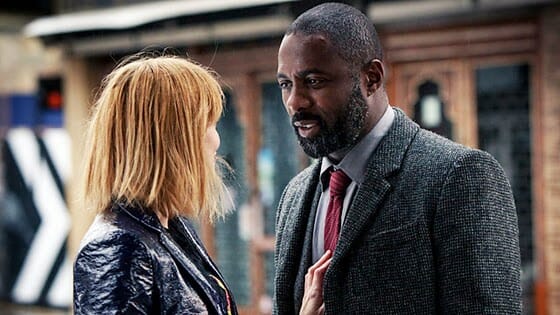Luther: “Episode 3” (Episode 3.03)

Lesson One: If you play God, you play Him with ego
Episode 3.3 of BBC America’s Luther is the most philosophical installment yet in a show that’s become a true rival to Sherlock for the title of TV’s best crime drama. Together, the shows make an unlikely pair; Sherlock the bright, intelligent striver, and Luther the dark, brooding anarchist. Even their outlooks on London could not be more wildly disparate. But they share one important element in common: The leading men operate outside any boundary they encounter. In this way, Detective Chief Inspector Luther is like a modernized version of Conan Doyle’s creation, but weighed down with the sullen anxieties of a blighted modern landscape.
As a rule, Luther (Idris Elba) has always been guilty of letting his own moral compass trump the English justice system when it comes to the fate of London’s worst criminals. It’s essentially his calling card, and it’s defined him from the start. Back in 2010, the show’s pilot opened on Luther chasing the first of what would become an endless supply of psychopaths, finally cornering him in an empty warehouse. As the man—a convicted pedophile—hung from a ledge, Luther extracted a confession in exchange for salvation, and then let him fall to his death anyway.
He passed the fatal judgment, protocol be damned. But he can also be merciful—an episode ago, he was content to let a murderer go free because his victim was a cyber bully who had taunted the man about his young daughter’s death. In Luther’s code, the killing was justified and should be left alone, and only the dogged efforts of DS Justin Ripley, his assistant, brought the man to justice. All his efforts wrought, though, was the imprisonment of a man who would never kill again and a sad fate for a sick wife now deprived of her only caretaker. In this case, an act of foreshadowing, the gods of the writer’s room gave Luther their nod; his mercy was the right idea.
Now, in the series’ third episode, Luther has found his criminal alter-ego. Tom Marwood’s wife was raped and killed by a criminal who had been released after serving just half of a prison term for armed robbery. Unlike some of the other villains Luther stalks, Marwood’s motivations aren’t kept secret for very long. He shoots and kills a pair of hoodlums with a shotgun (saving a young couple from rape and death in the process), and hangs a burglar from a tree in a city park. The burglar had been released from jail on time served after letting his housemates starve and kill their four-year-old daughter, and the thugs had a similar story—”people the justice system spat out,” as Luther says. Marwood tapes a piece of black paper across the mouths of his victims, with yellow letters listing a website and a time. When the promised hour arrives, the killer releases a video—with no attempt at disguising himself—and vows to succeed where the justice system has failed. “It’s time for that failure to end,” he intones.
There’s righteous fury, and the motive is easy to understand. His cause is moral, too. But there’s something else—a self-satisfaction, bordering on smugness. He’s got every right to be upset, but then, there are a lot of innocent victims in this world. Not all of them spawn vigilante action from friends or loved ones. That takes ego, and beneath the sadness and rage, we see the ego in Marwood. Just like we see it in John Luther. These men think themselves above the system, and they don’t allow a moment’s doubt to cloud their decisive action. In order to play God, you must see yourself as godly.
Lesson Two: Rigid morality makes you vulnerable, not strong
Luther and Ripley devise a simple strategy for tracking Marwood down. He’s off the grid, but they think if they can supply protection to high-profile criminals who have received significant press coverage and were later released, they may be able to anticipate his next move and catch him in the act. But the net is too wide—over 200 targets, at first—and Marwood is too fast. He stalks and kidnaps his next victim, another pedophile, and uses his keys to take him to the clubhouse where he and his fellow sex offenders practice their dark arts.
In the process, though, Marwood intercepts a phone call from Luther to his brother-in-law (he cloned his cell) and lies in wait when the detective comes to question. A chase ensues, and after nearly escaping on a cement path that runs alongside a canal, Luther heeds a shouted threat and stops. The small waterway separates Marwood and Luther, and they proceed to have a fascinating discussion. “You’ve never been tempted,” asks Marwood, “to administer a bit of personal justice?” He can’t know it, but that’s exactly what Luther has done on repeated occasions.
-

-

-

-

-

-

-

-

-

-

-

-

-

-

-

-

-

-

-

-

-

-

-

-

-

-

-

-

-

-

-

-

-

-

-

-

-

-

-

-








































